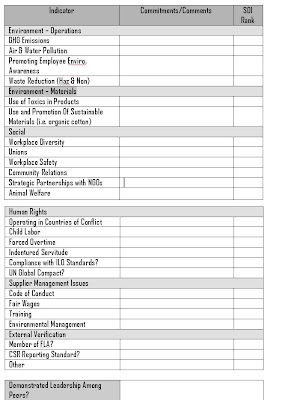Template
The Issues Template is used to summarize the key issues that are being evaluated for each company. Some might say that apparel companies should focus their efforts on issues that are most relevant to their business operations - mostly labor issues, wage issues, worker training, product safety/quality, etc. However, I have added environmental issues into the mix for several reasons. Environmental issues, like climate change and water pollution, are growing in importance to society at large and companies should at least, at this point, be getting a sense of their impacts. Personally, I also see this as a differentiation marketing strategy and as a way to be prepared for any potential legislation on the environment. In addition, negative public opinion can adversely affect sales, and the public is calling for more environmental awareness on the part of companies.
Definitions
GHG Emissions: Is the company tracking its emissions from its operations? This does not have to include supplier emissions, but should include all stores, offices, distribution networks (from warehouse to stores, stores to outlets, etc.)
Air and Water Pollution: Is the company tracking its air and water pollution?
Employee Awareness: Is the company doing anything to make its employees aware of environmental issues? Educating employees is a incredibly effective way for a company to have a position environmental impact.
Waste Reduction: Does the company track waste (both hazardous and non.)?
Toxics in Products: Does the company do anything to reduce the use of toxic chemicals in their products?
Promotion of Sustainable Materials: Is the company doing anything to use more organics or other sustainable fibers/materials?
Workplace Diversity: Does the company seek to promote a diverse workplace (this does not include suppliers, but does include stores, admin. offices, warehouses, etc.)?
Unions: What is the company's position on unions?
Workplace Safety: Again, not including suppliers.
Community Relations: How does the company work with the communities that are touched by its business? This can include communities surrounding suppliers, if the company sources a large percentage of its product from that one supplier.
NGOs: Does the company try to work with NGOs to address issues or create opportunities?
Animal Welfare: Is there any action to promote humane treatment of animals if the company uses leather, fur, etc.?
[Note: many of the "Human Rights" issue categories are aimed at determining how companies work with their suppliers in other countries, rather than how it treats its own employees in the country of origin.]
Countries of Conflict: Does the company operate or use suppliers from countries of conflict where their business activities are promoting adverse impacts on the population or environment of that country?
Child Labor: What does the company do/say about child labor?
Forced Overtime: This is when employers force employees to work more than whatever the accepted standard is. In the US, it is 40 hours per week or, sometimes, 8 hours per day.
Indentured Servitude: An indentured servant is a laborer under contract of the employer for some period of time, usually three to seven years, in exchange for such things as ship's passage, food, land and accommodations. And believe it or not, it still happens fairly often in some countries.
Compliance with ILO standards?: "Since 1919, the International Labour Organization has maintained and developed a system of international labour standards aimed at promoting opportunities for women and men to obtain decent and productive work, in conditions of freedom, equity, security and dignity." (from here) Read more here.
UN Global Compact: "The Global Compact is a framework for businesses that are committed to aligning their operations and strategies with ten universally accepted principles in the areas of human rights, labour,the environment and anti-corruption ."
Code of Conduct: Does the company have a Code of Conduct that must be adhered to by suppliers?
Fair Wages: What does the company do to ensure that its suppliers are paying "fair" wages to workers producing the brand's products?
Training: Does the company do any training for suppliers on improving efficiency, operations management, employee management, environmental management, etc.?
Environmental Management: Does the company do anything to track the environmental impacts of its suppliers.?
Member of FLA?: The mission of the Fair Labor Association (FLA) is to combine the efforts of industry, civil society organizations, and colleges and universities to protect workers’ rights and improve working conditions worldwide by promoting adherence to international labor standards. The FLA conducts independent monitoring and verification to ensure that the FLA’s Workplace Standards are upheld where FLA company products are produced. Through public reporting, the FLA provides consumers and shareholders with credible information to make responsible buying decisions. More here.
CSR Reporting Standard?: Disclosure and transparency are very important. There are number of different reporting standards (i.e., AA1000, Global Reporting Initiative, find more examples here) that a company can use to make its reporting more organized, more substantial/comprehensive and more credible.
Closing Thoughts
Although I think that this list of issues is actually larger than it necessarily needs to be, it does not mean that a company needs to focus on every specific issue listed. However, I do feel like the majority of these issues represent real operational risks (whether from public opinion, the legal perspective or operational efficiency) that companies need to start getting their heads around.
Tuesday, May 13, 2008
Subscribe to:
Post Comments (Atom)



1 comment:
wow, nice blog! I appreciate your mission.
Post a Comment